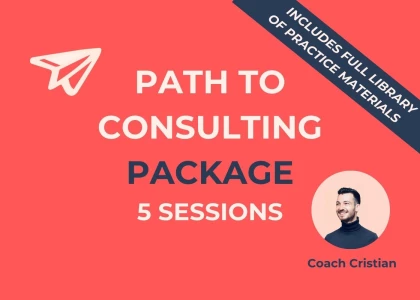Did you use a coach that made you an advanced caser? Did you buy a specific course? Were there a few key things that you found late in the process, that ultimately allowed you to break the barrier and become great?
What was the most beneficial part of your case prep?


That's a great question.
As a candidate, what made the biggest difference for me was setting a routine for practising and then tracking my progress. I practised over the course of two months, had a regular case partner and did around 100 cases in total. I also reached out to several friends who were already in consulting firms to run mock interviews with them.
As a coach, what I see makes the biggest difference is understanding early on how to identify and amplify your strengths. And more generally, to rely more on your common sense (which can be sharped through first principles thinking) rather than learning typical frameworks.
If you're at the start of the recruitment process, you might find this article helpful:
Best,
Cristian

Hi there,
As coach I might be a little bias here but all my candidates comment on the quality of the feedback. I was real interviewer at McKinsey with +200 interviews so I can give very detailed feedback on your strengths, what you need to improve and how to do it.
Happy to keep talking about this in private, just send me a message.
Best,
Alberto
—
Check out my latest case based on a real MBB interview: Sierra Springs

Hi there,
The key differentiator is always to discuss with someone or get insights from someone who knows what they are talking about as early as possible in the process.
The problem in the current consulting recruiting landscape is that 95% of resources are either outdated or plainly wrong and misleading, often more than 20 years old (the time VC spent at McKinsey) or written by people who have never worked in consulting (CIP, many case coaching and consulting application websites).
The stuff that you find ranking high after a Google search or the most commonly distributed case books is crazy (from broader issues like the typical framework advice to more detailed things like articles on McKinsey PEI dimensions and questions,…).
As a candidate, it is extremely hard and often impossible to separate good advice from bad advice.
The are a few ways to overcome that issue:
1. Find a reputable coach with a track record (not possible for everyone)
2. Leverage the PrepLounge forum to ask your questions and get good advice for free
3. Get a good case book for cheap. I wrote one and it demystifies the whole process and provides an accurate and current depiction and prep strategy for all consulting interviews.
4. Discuss with friends/peers in the relevant firms. While they might not know everything (maybe they are still junior, have no idea how interviews work/are scored), they can share some accurate observation points and recent details about the recruiting process and interviews.
When I was preparing for full-time positions, I did the latter early in the process and it made a ton of difference in how I was approaching cases and fit interviews.
In short:
- Filter the quality of information you ingest related to case and fit interviews.
- Critically evaluate if the information you are reading/hearing is from a reputable source, outdated, or from an anonymous source.
- If you come across conflicting info, ask a question here to the coaches in the forum.
- Individually, check experts' LinkedIn profiles to confirm their resume/experience is valid.
All the best,
Florian

As expected, most (if not all) people answering here are coaches.
But I was a candidate multiple times, and used many different approaches in my preparation.
What I can tell you is that using bad preparation materials is worse than almost no preparation (having said this, trying to answer cases and doing cases with peers is almost always good preparation). Unfortunately a lot of material out there was done by people who did not have consulting experience, had only 1-2 years for experience as an analyst (and never interviewd anyone), or are MBA case books with answers written by many candidates who did not pass the interview (or otherwise passed but have no clue on WHY they passed, i.e., what was a good approach vs. a bad approach).
Books like Case in Point (and that type of suggested approach) are definitely something to avoid.
Regarding coaches, I would avoid (at least in the early preparation phases) those who only conduct interview simulations. You need a guide, someone to mentor you into using good materials and able to provide you with relevant customized advice.

Love this Q! You'll get mostly coaches here. Highly recommend fishbowl/MCP to get user comments!
Here's some reading to help you with your case prep: The Most Common Pitfalls in Case Interview Preparation














